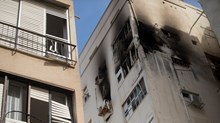Sixteen huts fill the open space around the village church at Poorvarsankulam near Vavunniya, 170 miles north of Sri Lanka's capital, Colombo. The huts, made of coconut-palm leaves, are home to two dozen Tamil families—about 100 people in all—refugees from Sri Lanka's civil war.The church compound belongs to the Church of South India (CSI), a united church mainly based in India but with a diocese in Sri Lanka.The immediate neighbors of church-run refugee camp are Sri Lankan army personnel in their bunkers across the muddy road in front of the church. Behind the church is the frontline between the Sri Lankan army and Tamil separatist guerrillas, who are fighting for an independent Tamil state in the north and east of the country.Hundreds of Tamil families around Vavunniya had to flee last November when renewed fighting broke out between the army and the Tamil Tigers. Vavunniya marks the border between areas controlled by the army and by the Liberation Tigers of Talim Eelam (LTTE), also known as the Tamil Tigers. The army describes the LTTE-controlled territories as "uncleared" areas.Since 1983, when the LTTE began its open war against the Sri Lankan army, nearly a million people have been made homeless.Perumal Velu, a 79-year-old Hindu refugee taking shelter in the church compound, told ENI: "We are lucky to have got shelter here." He and his family live on a ration of dry rice and cereals worth US$18 a month, provided by the Sri Lankan government's relief program for internally displaced people. Just over a mile away from the CSI camp, Mallika Mary was busy preparing to move to a different camp. The government ordered her to shift to a new location, two months after "settling down" here.She told ENI that her odyssey began in 1990 when she was first "displaced" from Jaffna, on the northern fringe of Sri Lanka. Since then, she had been forced to move her "make-shift house" seven times."Life is a real hell for these people," said Methodist pastor Albert Swarnaraj, who spends his day visiting refugee camps in and around Vavunniya. Swarnaraj runs four nursery schools in the makeshift refugee camps, providing 150 children with the only "nutritional" food they receive, funded by church charities.According to the Anglican archdeacon of Jaffna, Joseph Sarvananthan, life is much more difficult for Tamil civilians in the rebel-held areas which are blockaded by the Sri Lankan army.Except for basic food items like dry cereals, the Sri Lankan army does not permit Red Cross and other charity workers to provide food to LTTE areas. Milk products for babies, and common medicines, as well as cotton and sanitary towels, are banned in case they are used to treat injured LTTE personnel."The world is not aware of the human suffering as a result of the civil war," according to the archdeacon, who, as head of the relief and rehabilitation program of the National Council of Churches of Sri Lanka, frequently visits LTTE-controlled areas.While the welfare departments of the Sri Lankan government no longer operate in the LTTE-controlled areas, where an estimated one million Tamils live, Caritas Sri Lanka—the social action arm of the Catholic Bishops' Conference of Sri Lanka—spends more than 4 million rupees (US$60,000) every month to provide at least one meal a day to 13,500 schoolchildren."The children come to the temporary schools [many of them run by churches] with just a cup of tea. We cannot teach them on empty stomachs," the director of Caritas Sri Lanka, J. B. Devarajah, told ENI in his office in Colombo. "Perhaps this is the only meal they have in a day."He added that Caritas was also eager to make health workers and medicines available to the displaced people. A shortage of basic medicines meant that even common diseases like fever could lead to death and the death rate was very high in the rebel-controlled areas. Caritas had set aside funds to facilitate burials, including for non-Christians. Tamils are not the only people affected by the civil war. In several Buddhist villages near LTTE-controlled areas, the government machinery is virtually dead. Government-paid teachers refuse to teach there fearing attacks by the LTTE, according to the NCC general secretary W. P. Ebenezer Joseph.Copyright © 2000 Ecumenical News International. Used with permission.
Related Elsewhere
See our earlier coverage of this issue, " Sri Lanka's People Are Not Divided, Just the Politicians, says Archbishop | Churches call for peaceful end to Tamil fighting (Feb. 28, 2000)A profile of Christianity in Sri Lanka appeared in our Nov. 16, 1998 issue.For more coverage of the Tamil conflict, see the BBC's news site (or try the BBC's South Asia page). More articles, resources, and links are available at Yahoo!'s full coverage area on Sri Lanka.
Copyright © 2000 Christianity Today. Click for reprint information.

Annual & Monthly subscriptions available.
- Print & Digital Issues of CT magazine
- Complete access to every article on ChristianityToday.com
- Unlimited access to 65+ years of CT’s online archives
- Member-only special issues
- Learn more
Read These Next
- Trending
 While we pray for peace, we need moral clarity about this war.
While we pray for peace, we need moral clarity about this war. - From the Magazine
 We’ve got little information on Jesus’ appearance and personality. But that’s the way God designed it.españolFrançais
We’ve got little information on Jesus’ appearance and personality. But that’s the way God designed it.españolFrançais - Editor's Pick
 The Grammy-winning artist was found dead at her home in Nashville at age 47.
The Grammy-winning artist was found dead at her home in Nashville at age 47.













